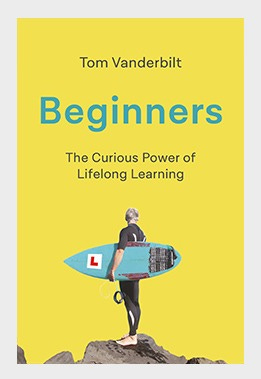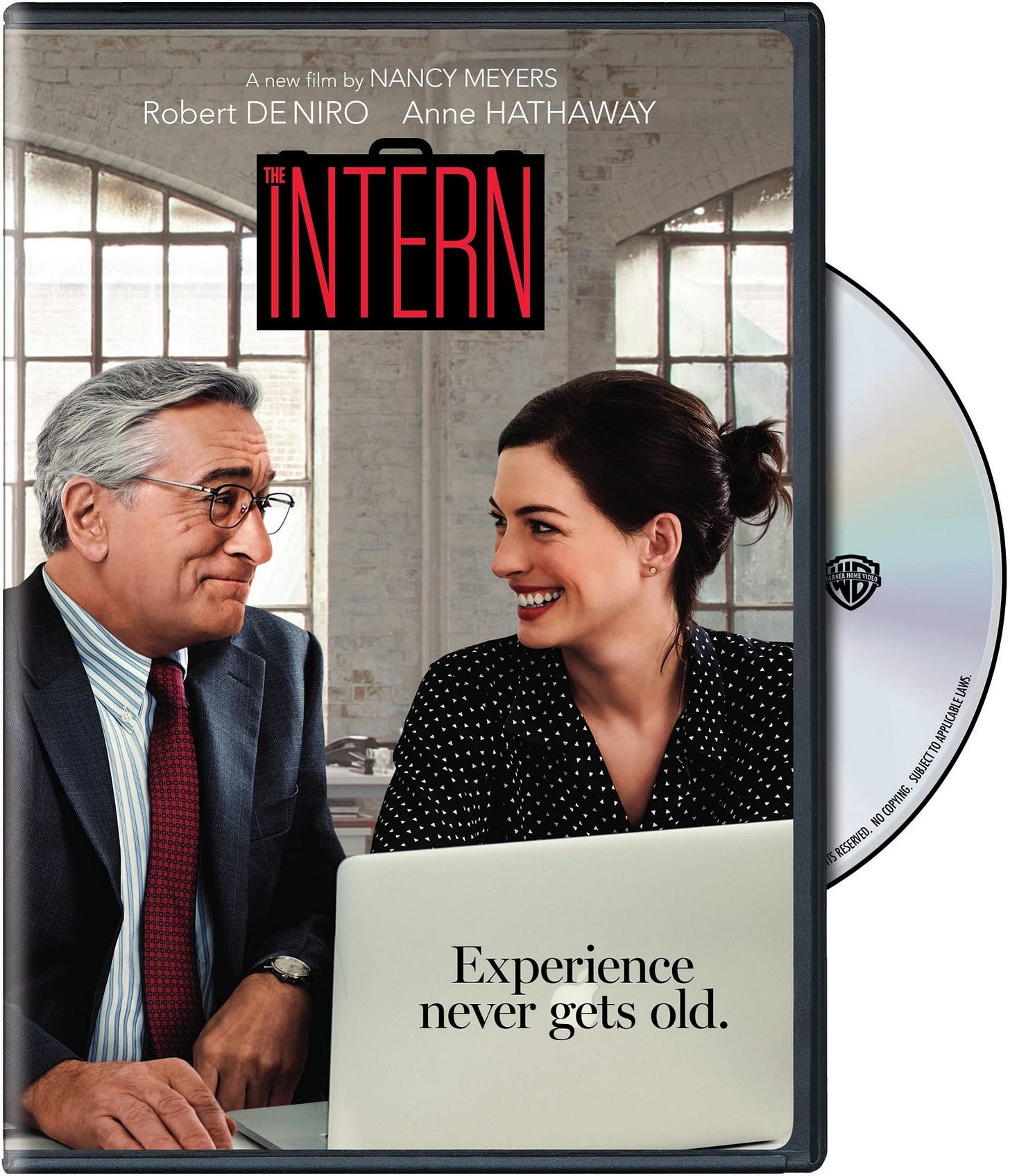Never too late: Interns, Beginners and the Passion for life-long learning
How late is too late? When do you stop being a beginner and why are we so afraid of trying new things out?
Happy Sunday! 👋 I’m Francisca and I’m happy to visit your inbox for another Sunday fresh read with a new (or old?") take on a movie, book, song, or any pop / culture reference and how that might inspire you to be more creative, innovative, or start being an intrapreneur at work.
Ready for another one?
Today’s Key Takeaways: It’s never too late to start, and rarely too early to try. Know your strengths, embrace your weaknesses, and surround yourself with people who inspire or support your goals.
What could a book by a journalist (inspired by his daughter learning chess and exploring lifelong learning) and a Hollywood movie starring Robert DeNiro and Anne Hathaway possibly teach us about innovation and collaboration? And how can they help us push ideas, change minds, and maybe even shift some stubborn processes?
If you’re looking for reading & watching recommendations for this week, let them be these two from today’s post!
Today, I’m diving into Beginners by Tom Vanderbilt: a book that truly captivated me this year.
I also bring you a movie that I had a blast rewatching the other day, from 2015: The Intern.
Beginners: The Curious Power of Lifelong Learning
Why are we so keen on having kids experiment so different activities and be beginners - and tell them that they should continue trying just a few more times before quitting, if nowadays we’re so adverse to the same thing as adults?
While learning how to play Chess with his daughter and a tutor to teach them both, Tom eventually was captivated not by the activity itself, but by the “science” of learning. Learning how to play chess wasn’t just bonding. It somehow turned into a year of seeking to learn: from drawing to juggling to playing chess or open-water swimming.
He was noticing how his daughter was adopting things she had recently learned into her actions, and how he looked at learning a bit differently, and what could contribute to this difference.
Eventually, while waiting for his daughter to finish her tournaments, Tom Vanderbilt realized that many adults encourage their kids to try new things but don't bring that same spirit into their own lives (often having dull weekends while the kids are busy).
Somewhere along the way, we lose this spirit. Vanderbilt challenges us to rethink that mindset by stepping back into the awkward, messy phase of picking up a new skill, by embracing the process without worrying too much about the end result.
Doing this helps us stay adaptable and reconnect with that sense of curiosity and wonder we often lose as we grow older.
How can we be great at starting from 0? What should we do or have?
Patience - Adults tend to give up quickly when things get tough, unlike kids who are encouraged to keep going even when they're struggling. If we let ourselves stay the course through those early, frustrating stages of learning, we actually open ourselves up to growth. It’s in that uncomfortable space that we really make progress, learn new skills, and find fulfillment beyond just being competent.
Lean into the power of community when it comes to learning. Vanderbilt realized that learning alongside his daughter and sharing the experience with others made the process more enjoyable and motivating.
We can apply that to our lives by finding group learning environments or a buddy to share the journey with. It’s not just about accountability—it’s about making learning fun and building connections along the way.
Learning needs to be seen as an ongoing adventure rather than just a means to an end - that’s when what we’re doing stops being about achievement and starts being about how we grow through the experience.
I also love how Vanderbilt explores and deep-dives into the "why" of lifelong learning by consulting experts, scientists, and researchers to provide a well-rounded view of learning throughout life.
Some of my favorite quotes:
Children, in a very real sense, have beginners’ minds, open to wider possibilities. They see the world with fresher eyes, are less burdened with preconception and past experience, and are less guided by what they know to be true. They are more likely to pick up details that adults might discard as irrelevant. Because they’re less concerned with being wrong or looking foolish, children often ask questions that adults won’t ask.
We could all learn from this book: we give incentives for babies to keep crawling, until they learn how to stand up from the floor and start walking, and eventually teach them how to give their first steps. When they fall, they go back up. There’s actual research and professionals cited about this, which makes it a worthy read.
And from an interview to CNN1 (and why I connect this to the movie The Intern):
Cillizza: Finish this sentence: “The biggest lesson my book taught me about human behavior is _____________.” Now, explain.
Vanderbilt: “People are not closed books.”
We begin so many things when we’re young. We try many different sports, we sing in the school choir, we draw, we’re told our horizons are endless. Over time, those horizons shrink; sometimes out of necessity, other times simply because we, or someone else, doesn’t believe we’re good enough to try our hand at something. Like a river flowing into a narrow canyon, there’s a sort of winnowing of experience, and it’s often difficult to swim upstream against that.
But we’re not done, our story’s not over. We may not become the next Picasso — no one can, he already was. But we can create things, move our body, express our voice and our vision, in our ways, in our time, at any age. Sometimes, people’s greatest passion is unlocked in some curious pursuit that’s totally outside what they normally do; the actor who throws pottery, the baseball player who starts a book club, the CEO who loves to do Ironmans. We shouldn’t think of these as distractions, or some watering down of who are, but our very strength.
Excerpts of the book can be found in several podcasts and also here, specifically about Juggling - which has more to do with what we’re doing wrong when trying to learn: we focus on every step we’re supposed to do, instead of relying on muscle memory, like we do when we drink a glass of water or write our name on a blackboard, graffiti or a pen and paper.
In interviews for my book ‘Beginners’ I am often asked if I am still trying to learn new things, and usually answer something like ‘whenever I can.’ Lately, for example, my daughter and I rather fell into the world of downhill mountain biking, a pursuit that often entails leaving the ground — an idea which, frankly, terrified me. So, aided by some excellent coaches at @killingtonmtn we tried to achieve liftoff. Nothing major, but over the course of two days we went from active avoidance to becoming ‘jump curious.’ I wrote about the experience for @outsidemagazine.
The Intern: What we can learn from a comedy about cross-generational learning & collaboration
The Intern is more than just a feel-good comedy; it’s a refreshing take on what happens when generations meet in the workplace.
Through the story of Ben Whittaker (Robert De Niro), a 70-year-old widower interning at a startup, and Jules (Anne Hathaway), the driven CEO, we see the value of blending old-school wisdom with modern ways of working. Ben’s experience and steady perspective help Jules navigate her high-stakes world.
We also see a bit on how to navigate the Power Map, and how a structure where you fear your boss it can drive you away from giving good ideas at work.
The film highlights that collaboration isn’t just about skills: it’s about different life experiences coming together. It teaches us that cross-generational relationships can inspire more understanding, spark creativity, and lead to more balanced and effective leadership. The core lesson?
True innovation succeeds when people are willing to learn from each other, regardless of age or background.
In an interview to Impulse Gamer2 about the movie, Nancy Meyers, the producer of this movie replies:
QUESTION: Part of what we know and love about Nancy Meyers’s catalog of films is how she always finds fresh, witty ways to address various social issues. Nancy, can you talk about some of the ideas you wanted to weave into The Intern?
NANCY MEYERS: Obviously, the concept of retirement – whether or not you’re ready for it, and somebody’s desire to stay part of things and not be pushed aside – is talked about. I enormously enjoyed all the research I did about start-ups; I found that whole culture interesting. (…) But the primary thing I wanted to write about was the friendship between two people that is, in its own way, a love story, but not a romantic one.
And Anne Hathaway:
QUESTION: For Nancy and Anne, there’s a sense that it’s lonely at the top for Jules in the film. Is this something that you see particularly in successful women, wherever they are in society?
ANNE HATHAWAY: (…) One of the things that I love about the movie is that Jules has so much heart and she builds an incredible structure. It has bones, but there’s no connective tissue in it and nobody at the company knows how to build connective tissue. That’s where Ben comes in, and he kind of figures out how to get everybody to connect to each other.
I liked this interview as it paints how, even in movies, they get something right: You need a Hobbes to a Calvin, an Agent 99 to a Maxwell Smart, you see the pattern here? There’s a Ben to a Jules. Duos and partnerships can really make it easier for you to get your idea off the ground, where one gives it thoughts and creativity, the other gives it structure, bones.
From Beginners to Interns: Why we should have a bit of both and how that makes us better innovators
What do they have in common?
Combining the beginner’s openness to learning with the depth of experience creates a powerful formula for innovation. Beginners remind us to be curious and patient. The Intern reminds us the importance of mentorship, asking for help, and being fine with being the oldest (or the youngest) in the room, and being okay with not being the best.
They remind us that it’s never too late to start something new or learn a new skill. Ben, the intern, even did a video interview, learning what is an USB and the differences between a .mov file and an .mp3 file - just to get the internship!
They encourage us to lean into our strengths while embracing our weaknesses.
They show that collaboration, curiosity, and diverse perspectives make us better at work - which in our case, is all about innovating small or big tasks with our ideas, to improve the processes we work with at work.
The result is a more holistic approach to solving problems and driving change: one that embraces creativity, resilience, and collaboration.
Embracing both perspectives encourages us to stay curious and connected, making it easier to find new ways to approach challenges and bring fresh ideas to life.
Takeaways for Tomorrow:
Next time you’re at work, consider this: The colleague whose perspective you dismiss might have insights that could make all the difference.
Are you afraid to ask for help or to step into something unfamiliar just because you might fail?
We limit ourselves because we fear failure or judgment. But why not embrace being a beginner again—find joy in trying, falling, and getting back up?
Rounding up
It’s never too late to try, and it’s rarely too early to explore. The path to innovation is paved with curiosity, openness, and the willingness to start from scratch, so it’s a good idea to embrace both the learning of a beginner and the wisdom of experience. No matter where we are in life, there’s always value in staying curious and connected.
With a bit of patience, curiosity, and collaboration, we can all be 'intern'-ally (see what I did here) inspired to begin again. Let's juggle our fears, dive into new challenges, and keep learning, because it's never too late to start something amazing!
Last but not least:
Yesterday, I was around Substack notes in the morning and came across a post that highly resonates with this Substack Intrapreneurs’ Hub - the place for people wanting to innovate more (at work, but this is also highly transferable for life in general).
This is exactly why I have this Substack! I replied to the post with some of my tips here, here and here.
If this sounds familiar to you, then you’re in the right substack! If you’re not subscribing yet, what are you waiting for? :)
Curious for more of these informal reads?
Here’s a few of the latest Sunday posts!
The things that inspired this post:
The movie: The Intern - In 3 words, this book is about: mentorship, purpose and persistence
The book: Tom Vanderbilt - Beginners. In six words: the book is about Learning, Failing, Adapting; Humility, Growth and Curiosity.
Vanderbilt, Tom. Interview by Chris Cillizza. "What the ‘Beginner’s Mind’ Can Teach Us about Politics – and Life." CNN Politics, last accessed November 10, 2024
I had been looking for interviews that weren’t based on Youtube, so I found this one. Meyers, Nancy. Interview with Impulse Gamer. "The Intern: Interview Q&A with De Niro, Hathaway, Meyers." Impulse Gamer, last accessed November 10, 2024







Indeed, it is never too late to learn. Personally, I got bored when I temporarily stopped learning once I graduated college. I dove back in to independent learning within the year. An added benefit of continued learning - it is good for our brains and longevity!
I'll add the book to my to do list and I actually watched the film recently, it's a real easy watch. I'm "happy at you" for writing this, I enjoyed reading it.
I've been writing about the Dunning Kruger effect and how having absolutely no idea how to do something as a beginner can be a benefit to getting started but then as soon as we learn that it's not as simple as we thought, that's when we give up.
In many ways the ignorance of being a beginner is the best part.